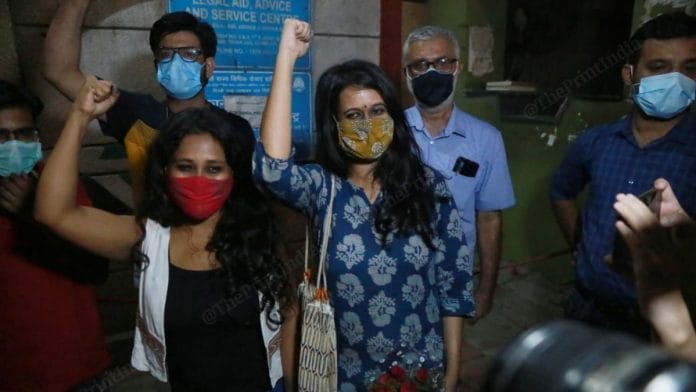New Delhi: The Supreme Court Friday agreed to examine the Delhi High Court verdict granting bail to Pinjra Tod activists Devangana Kalita and Natasha Narwal, and Jamia Millia Islamia student Asif Iqbal Tanha.
In an appeal filed by the Delhi Police against the bail order, a Supreme Court bench described the “100-page” judgment, passed Tuesday, as surprising, troubling and having wide ramifications.
The bench led by Justice Hemant Gupta also issued notices to Kalita, Narwal and Tanha.
In its judgment, the HC had watered down the provisions under the anti-terror law, the Unlawful Activities Prevention Act (UAPA), and held that it should not be invoked to deal with criminal acts that squarely come under the Indian Penal Code (IPC).
The order had indicted the Delhi Police for slapping UAPA charges against the three student activists for merely participating in protests against the Citizenship Amendment Act.
Right to protest, the HC said, was part of fundamental rights and could not be bracketed as a terror act under UAPA.
However, the Supreme Court agreed with the Delhi Police argument that the HC judgment has raised several questions, since it virtually comments on the constitutionality of UAPA even though that was not a subject matter before the court.
The bench went on to order that the HC judgment “shall not be treated as a precedent and may not be relied upon by any of the parties before any court”.
Meanwhile, Solicitor General Tushar Mehta’s request to stay the operations of the HC order was not allowed.
Appearing for Delhi Police, Mehta had noted that the HC observations would affect other pending cases under UAPA. He, however, clarified that he was not asking for the three activists, who were released Thursday, to be sent back to jail.
While the SC accepted Mehta’s contentions, the bench said that the release of Kalita, Narwal and Tanha on bail would not be interfered with at this stage.
This means the HC order will remain operational for them, but at the same time it cannot be used as a basis by other co-accused in the case to seek bail.
Also read: ‘Feels unreal to see sky’: Natasha Narwal, Devangana Kalita, Asif Tanha leave Tihar on bail
‘Delhi HC order turned UAPA on its head’: Mehta
In its appeal, the Delhi Police claimed the HC verdict is without any foundation and appears to be based more on social media narrative than the evidence gathered and elaborated in the chargesheet.
In an appeal filed before the apex court, within 24 hours of the HC order, the Delhi Police took strong exception to the court’s view that the case related to the larger conspiracy behind last year’s riots was registered by the “Government to suppress dissent”.
“The judicial scrutiny was not to ascertain as to whether evidence on record prima facie the accusations were true or not but to somehow establish that the present case was a case of protest by students and suppression of dissent by the government of the day,” the appeal stated.
During the arguments Friday, Mehta said the HC had turned “UAPA on its head”.
He advanced a two-fold reasoning to seek a stay of the order. First, Mehta said, it virtually pronounces acquittal of the accused in a bail order and second, the observations regarding application of UAPA have far-reaching effect on other pending cases, including those accused in the Delhi riots case.
Mehta submitted that the interpretation of UAPA suggested by the court meant a terrorist accused of murder cannot be tried under the law, but only under IPC charges.
“The court has said that since the riots eventually were controlled, UAPA should not have been invoked. This means if an investigating agency diffuses a bomb planted somewhere, then as per this judgement, anti-terror law charges shall not apply,” Mehta contended.
He further asserted that ‘right to protest’ did not include the right to kill people and haul a bomb.
Mehta added that if the judgment is to be accepted, then the lady who killed the prime minister would also be innocent because, in her mind, she too was protesting.
Meanwhile, Senior Advocate Kapil Sibal, representing Kalita and Narwal, also agreed with the top court’s suggestion that the matter requires examination vis-a-vis interpretation of UAPA.
“Let this court decide the larger issue and settle the law once for all,” he said.
But when Sibal offered to remind the court that it was hearing an appeal against a bail order, the bench said: “That is what we are saying. It was a bail order and for the HC to write 100 pages on it and to discuss the laws is surprising.”
Sibal also raised an objection regarding maintainability of the Delhi Police appeal and highlighted the fact that the DCP had filed it under his name. The Delhi Police appeal was filed by P.S. Khushwah, deputy commissioner of police, Special Cell.
“How can a police officer file an appeal on behalf of the state,” he said, urging the court to look into this question first.
While granting four weeks to Kalita, Narwala and Tanha to respond, the bench said it would hear the matter again in the week commencing on 19 July.
(Edited by Rachel John)
Also read: Nation’s foundations can’t be shaken by protest: Delhi HC gives bail to Kalita, Narwal, Tanha






